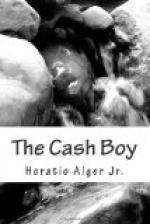THE ESCAPE
It was eight o’clock the next morning before Frank’s breakfast was brought to him.
“I am sorry you have had to wait,” the housekeeper said, as she appeared at the door with a cup of coffee and a plate of beefsteak and toast, “I couldn’t come up before.”
“Have the men gone away?” said Frank.
“Yes.”
“Then I have something to tell you. I learned something about myself last night. I was in the closet, and heard the man who brought me here talking to another person. May I tell you the story?”
“If you think it will do any good,” said the housekeeper, “but I can’t help you if that is what you want.”
He told the whole story. As he proceeded, the housekeeper betrayed increased, almost eager interest, and from time to time asked him questions in particular as to the personal appearance of John Wade. When Frank had described him as well as he could, she said, in an excited manner:
“Yes, it is—it must be the same man.”
“The same man!” repeated our hero, in surprise.
“Do you know anything about him?”
“I know that he is a wicked man. I am afraid that I have helped him carry out his wicked plan, but I did not know it at the time, or I never would have given my consent.”
“I don’t understand you,” said our hero, puzzled.
“Will you tell me what you mean?”
“Fourteen years ago I was very poor—poor and sick besides. My husband had died, leaving me nothing but the care of a young infant, whom it was necessary for me to support besides myself. Enfeebled by sickness, I was able to earn but little, but we lived in a wretched room in a crowded tenement house. My infant boy was taken sick and died. As I sat sorrowfully beside the bed on which he lay dead, I heard a knock at the door. I opened it, and admitted a man whom I afterward learned to be John Wade. He very soon explained his errand. He agreed to take my poor boy, and pay all the expenses of his burial in Greenwood Cemetery, provided I would not object to any of his arrangements. He was willing besides to pay me two hundred dollars for the relief of my necessities. Though I was almost beside myself with grief for my child’s loss, and though this was a very favorable proposal, I hesitated. I could not understand why a stranger should make me such an offer. I asked him the reason.”
“‘You ask too much,’ he answered, appearing annoyed. ’I have made you a fair offer. Will you accept it, or will you leave your child to have a pauper’s funeral?’
“That consideration decided me. For my child’s sake I agreed to his proposal, and forebore to question him further. He provided a handsome rosewood casket for my dear child, but upon the silver plate was inscribed a name that was strange to me—the name of Francis Wharton.”
“Francis Wharton!” exclaimed Frank.
“I was too weak and sorrowful to make opposition, and my baby was buried as Francis Wharton. Not only this, but a monument is erected over him at Greenwood, which bears this name.”




